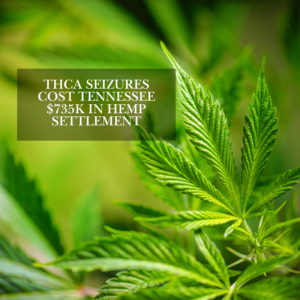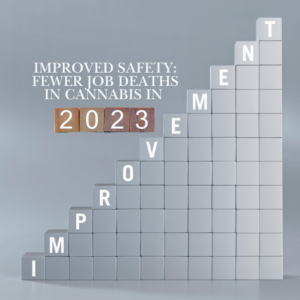Tennessee Sets New Limits on Hemp Product Distribution

Tennessee Hemp Retailers Brace for New Regulations from the Department of Agriculture
Tennessee’s hemp industry is facing major regulatory changes following new rules introduced by the Tennessee Department of Agriculture. These rules, effective December 26, 2024, are part of a broader legislative effort to bring structure to the state’s rapidly growing hemp market. With roots in the 2023 legislation aimed at regulating hemp production and sales, the new framework outlines specific guidelines on licensing, product testing, labeling, and taxation. As the hemp industry has expanded, particularly with products containing cannabinoids like Delta-8 and THCA, the state is taking steps to ensure consumer safety and industry compliance.
This article delves into the details of the new regulations, the implications for hemp retailers and consumers, and the expected challenges the industry may face as it adapts to the new requirements.
Background: The Rise of Hemp in Tennessee
Hemp production has been federally legal since the passage of the 2018 Agriculture Improvement Act, commonly known as the 2018 Farm Bill. This legislation defined hemp as any cannabis plant with a Delta-9-tetrahydrocannabinol (THC) content at or below 0.3%, separating it from marijuana, which remains a Schedule VI controlled substance in Tennessee and is illegal. This distinction allowed a variety of hemp-derived products, including some with mild psychoactive effects, to enter the Tennessee market.
Over the past few years, products containing Delta-8 and THCA have gained popularity due to their psychoactive properties and legal status within the hemp category. Delta-8 and THCA are alternative cannabinoids found in the cannabis plant, and they offer consumers effects similar to THC, though with varying intensity. The growing availability of these products has drawn attention from both consumers and regulators, leading to the push for a structured legal framework around the sale and distribution of hemp-derived goods in Tennessee.
Key Components of Tennessee’s New Hemp Regulations
The new rules developed by the Tennessee Department of Agriculture establish a comprehensive regulatory framework covering several aspects of the hemp industry. Key provisions of the rules include:
Licensing Requirements: Retailers and distributors of hemp products must obtain licenses to operate within the state. This provision ensures that businesses are held accountable and can be tracked for compliance.
Product Testing and Safety Standards: The new regulations require thorough testing for all hemp-derived products to confirm THC content and identify potential impurities. This measure seeks to protect consumers by ensuring that products meet the established legal definition of hemp and are free from harmful substances.
Labeling and Packaging Standards: To enhance consumer safety, the rules outline specific labeling and packaging requirements. Products must clearly display THC content, cannabinoid concentration, and safety warnings, and packaging must comply with guidelines to prevent access by minors.
Age Restrictions: In line with broader safety concerns, the rules set an age limit for purchasing hemp-derived products. Only individuals aged 21 and over are permitted to purchase items containing cannabinoids like Delta-8 and THCA.
Taxation on Hemp Sales: Tennessee’s new regulations include a tax component, setting a framework for the collection of taxes on the sale of hemp products. This step aligns with practices in other states that have regulated hemp and cannabis-derived product markets.
These new guidelines underscore the state’s commitment to ensuring consumer safety and product transparency while allowing the hemp industry to continue operating within a structured, legally compliant framework.
The Role of Delta-8 and THCA in Driving Regulatory Change
Products containing Delta-8 and THCA, cannabinoids similar in structure to THC, have played a significant role in prompting Tennessee’s regulatory updates. Delta-8, often extracted from hemp, offers psychoactive effects that appeal to consumers looking for a mild high, while THCA (tetrahydrocannabinolic acid) is a non-psychoactive compound that converts to THC when heated. Both have become popular alternatives for individuals seeking the effects of THC without running afoul of Tennessee’s marijuana laws.
However, the popularity of these products has raised concerns over product safety, as Delta-8 and THCA items are not always subject to rigorous testing and labeling. The new rules aim to address these concerns by enforcing strict testing, labeling, and age-restriction requirements to ensure that consumers are informed about the nature of the products they purchase.
Industry Reactions to the New Regulations
The response to Tennessee’s new hemp regulations has been mixed within the industry. Many retailers and industry experts see the benefits of formalized rules that prioritize safety and transparency. Attorney Alex Little of the Hemp Law Group noted that the new regulations, which introduce age limits and product safety testing, were widely anticipated and have garnered a certain level of support from industry stakeholders.
Retailers and manufacturers are adjusting their operations to meet these requirements. Licensing and testing standards are expected to add additional costs, particularly for small businesses that may not have previously adhered to such stringent guidelines. However, the broader impact is expected to be positive, as compliance with these regulations could help to legitimize the industry and build trust among consumers.
For some, the rules represent an opportunity to differentiate themselves as reputable, compliant operators. By offering certified, safe products, retailers can appeal to health-conscious consumers who value transparency and reliability. On the other hand, some smaller operators have expressed concerns about the financial burden of compliance, particularly with the additional costs of licensing, testing, and labeling.
Consumer Impact: Safety and Access to Reliable Products
For consumers, the new regulations are designed to offer peace of mind and protect against misleading or potentially unsafe products. With mandatory testing, buyers will have access to verified information regarding THC content and other cannabinoids. Clear labeling also means consumers can make informed choices about the products they purchase, especially as it pertains to psychoactive effects.
Age restrictions are another essential component of the new regulations, ensuring that products with psychoactive properties are only accessible to those over 21. This measure aligns with similar restrictions on tobacco and alcohol, reflecting a cautious approach to products that may affect minors.
While consumers may see a slight increase in prices due to the added regulatory costs, many are expected to welcome the assurance of safer and more transparent products. Tennessee’s regulations bring the state in line with other areas that have regulated cannabinoid products, contributing to a more uniform consumer experience.
The Path Forward for Tennessee’s Hemp Industry
As the December 26 compliance deadline approaches, Tennessee hemp retailers and manufacturers are taking steps to ensure their operations align with the new guidelines. Many are investing in improved labeling systems, contracting with licensed testing labs, and adjusting packaging to meet the new standards.
The state’s hemp industry is likely to face an initial adjustment period, but industry leaders believe these changes will ultimately benefit both businesses and consumers. By fostering a more regulated and transparent market, Tennessee aims to support responsible growth in its hemp sector while minimizing the risks associated with unregulated products.
The broader implications of these regulations also point to a potential model for other states considering similar measures. As the popularity of hemp-derived cannabinoids like Delta-8 continues to grow, Tennessee’s approach may serve as a blueprint for establishing clear standards in a rapidly evolving industry.
Tennessee’s new hemp regulations mark a significant shift for the state’s hemp industry, bringing clarity and structure to a previously under-regulated market. Through comprehensive licensing, testing, and labeling requirements, the state aims to protect consumers while allowing the industry to flourish within a legal framework. The focus on safety, transparency, and accountability sets the stage for a more robust hemp industry in Tennessee, paving the way for continued growth and consumer trust.
As Tennessee hemp businesses navigate these new requirements, the state’s regulatory approach may well influence other jurisdictions, reflecting a growing national trend toward the responsible oversight of hemp and cannabis-derived products.











